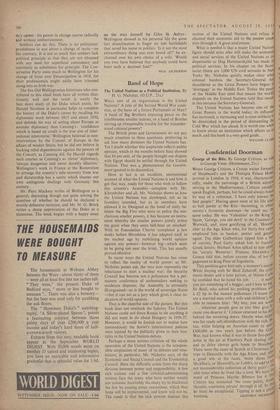Band of Hope
WHAT sort of an organisation is the United Nations? A relic of the Second World War coali- tion, or the basis of a future Parliament of Man? A band of Big Brothers imposing peace on the troublesome smaller nations, or a band of Bandas stirring up irresponsible trouble for the misunder- stood colonial powers?
The British press and Government do not pay much attention to these questions, preferring to ask how many divisions the United Nations has. Yet I doubt whether this scepticism reflects public opinion, which in the months before Suez showed that 84 per cent. of the people thought our dispute with Egypt should be settled through the United Nations. That was a phenomenon the Govern- ment ignored to its discomfort.
Here at last is an excellent, unemotional account of what the United Nations is and how it got that way, ready for those who wish to follow this autumn's Assembly—complete with Mr. Khrushchev and all. Mr. Nicholas shows us how the United Nations has developed, not as its founders intended, but as its members have allowed it to. Designed as the bond of unity be- tween the Big Five who were to police the mis- chievous smaller powers, it has become an instru- ment whereby the smaller powers jointly police the great when they.seem hell-bent on mischief. With its Foundation Charter completed a few weeks before Hiroshima it has adapted itself to the nuclear age by mobilising world opinion against any powers—however big—which seem to be going too near the brink. This has usually proved effective.
In many ways the United Nations has come to reflect the reality of world power; as Mr. Nicholas points out, the veto now represents the reluctance to start a nuclear war; the Security Council has become not a policeman but a per- manent conference of ambassadors seeking to moderate disputes; the Assembly is. extremely ill-organised—so is the world of sovereign States —but it can act as a jury which gives a clear in- dication of world opinion.
That is the cheerful side of the picture. But this book does not overlook the failures. The United Nations could not force Russia to do anything it did not want to do about Hungary in 1956-57. However, it would be foolish not to realise how tremendously the Soviet's international policies were injured by the publicity given to their bru- tality in the United Nations debate.
Perhaps a more serious criticism of the whole operation of the United Nations is the irrespon- sible utopianism of many of its debates and reso- lutions, in particular, Mr. Nicholas says, of the Economic and Social Council and the Trusteeship Council. Here the difficulty arises from the sharp division between power and responsibility. A few rich nations and a few colonial-administering nations face the many who have neither wealth nor colonies. Inevitably the many try to blackmail the few by passing pious resolutions, which they hope will be implemented, and know will not be. The result is that the rich powers distrust this section of the United Nations and refuse to channel their economic aid to the poorer cow? tries through it. A great misfortune.
What is needed is that a major United Nation figure should arise who will make the economic and social services of the United Nations as im dispensable as Dag Hammarskjold has made its political services. In his chapter on the Secre. tariat (there are 3,000 UN civil servants in NO York) Mr. Nicholas quietly makes clear what colossal burdens the Secretary-General has shouldered as the Great Powers have begun to 'disengage' in the Middle East. Today the peace of the Middle East (and that means the world) depends on the United Nations (and that means in this instance the Secretary-General).
The United Nations has become one of the Great Powers in the world today; its influence has increased, is increasing and is most unlikely to be diminished in the period of dismantling the Cold War which lies ahead. It is worth our while to know about an institution which affects us so much, and this book is a very good guide.
WILLIAM CLAIM














































 Previous page
Previous page